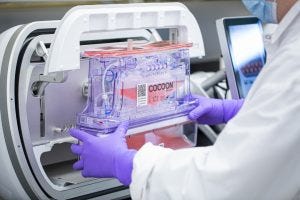Content Spotlight
Podcast: MilliporeSigma says education vital to creating unbreakable chain for sustainability
MilliporeSigma discusses the importance of people, education, and the benefits of embracing discomfort to bolster sustainability efforts.

Lonza will work with Agilent to define the ideal Critical Quality Attributes (CQAs) for cell therapy manufacturing and help better control the in-process controls and analytics of its patient-scale Cocoon platform.
Lonza’s Cocoon platform is a single system that can be used for a variety of different autologous cell therapy protocols, with each patient batch produced in a single disposable cassette customized to their specific process.
The automated point-of-care manufatcuring system was developed by Octane Biotech, and though Lonza has worked with the firm since 2015 to help develop the platform, it acquired a controlling stake in the company in October 2018, describing the tech at the time as a “game changer” in the autologous cell therapy space.

Image: c/o Lonza
Now Lonza is looking to optimize the platform by addressing the actual needs of the autologous cell therapy production space through a collaboration with analytics firm Agilent Technologies.
“Agilent is a leader in the field of analytics,” Nicholas Ostrout, senior director of Business Strategy & Implementation, Personalized Medicine, Lonza told BioProcess Insider. “We found their portfolio of technologies compelling, based on their participation in important research work that supports key advancements in cell therapy.
“We decided to leverage the existing innovative technologies of an established player in the market rather than reinvent these tools ourselves. By partnering with Agilent, we can bring these technologies to the market faster and within platforms that the field is familiar with.”
The collaboration aims to develop and integrate current and new analytical technologies into patient-scale cell therapy manufacturing workflows with the Cocoon Platform, but also hopes to define the ideal Critical Quality Attributes (CQAs) required for cell therapies and build improved analysis packages to manufacture higher quality therapeutic products with greater consistency.
“Generally speaking, the field is still in its infancy in its understanding of the CQAs required to manufacture a safe and efficacious product; there is a lack of clinical experience with cell and gene therapy (CGT) products, compared to other, more well-studied classes of pharmaceutical products,” Ostrout said.
“Therefore, the field is still developing a basis of understanding to define CQAs associated with a safe and efficacious product. The process is made even more complex by the fact that, unlike many other therapeutics, CGT products may persist in humans long-term, and are likely to evolve over time, thus necessitating a contextual understanding of product safety and efficacy within given indications and patient populations.”
Since the addition of the platform, Lonza has publicized several deals with companies and establishments looking to use the Cocoon tech, but it has only been used in a clinical setting since late 2020. While the platform can currently control temperature, pH, and dissolved oxygen, Ostrout said Lonza plans to enhance integrated analysis technologies in the platform with a hope that it will be able to monitor more properties in real-time during the manufacturing process to assist in meeting required specifications.
“There is value in generally establishing a deeper understanding of CQAs for cell therapies broadly in the field and implementing analysis technologies directly into the manufacturing platforms. As the field of cell therapy moves towards complete automation, we feel that there is an opportunity to begin integrating technologies directly into the manufacturing platform. This will assist in analyzing CQAs at relevant intervals during the process and understanding the key release criteria required to manufacture the ideal cell therapy for a given indication.”
He added: “The more functionality a closed system offers, the more compelling the automated manufacturing solution becomes. However, the quality of the therapy is obviously the most important aspect. As such, manufacturing platforms will have to become “smarter” to ensure the ideal product is manufactured for any given patient and indication. As therapies become more personalized, it’s critical that the manufacturing process can make adjustments in real-time.”
You May Also Like